The Intel Core i9-9900KS Review: The 5 GHz Consumer Special
by Dr. Ian Cutress on October 31, 2019 10:45 AM ESTCPU Performance: Encoding Tests
With the rise of streaming, vlogs, and video content as a whole, encoding and transcoding tests are becoming ever more important. Not only are more home users and gamers needing to convert video files into something more manageable, for streaming or archival purposes, but the servers that manage the output also manage around data and log files with compression and decompression. Our encoding tasks are focused around these important scenarios, with input from the community for the best implementation of real-world testing.
All of our benchmark results can also be found in our benchmark engine, Bench.
Handbrake 1.1.0: Streaming and Archival Video Transcoding
A popular open source tool, Handbrake is the anything-to-anything video conversion software that a number of people use as a reference point. The danger is always on version numbers and optimization, for example the latest versions of the software can take advantage of AVX-512 and OpenCL to accelerate certain types of transcoding and algorithms. The version we use here is a pure CPU play, with common transcoding variations.
We have split Handbrake up into several tests, using a Logitech C920 1080p60 native webcam recording (essentially a streamer recording), and convert them into two types of streaming formats and one for archival. The output settings used are:
- 720p60 at 6000 kbps constant bit rate, fast setting, high profile
- 1080p60 at 3500 kbps constant bit rate, faster setting, main profile
- 1080p60 HEVC at 3500 kbps variable bit rate, fast setting, main profile
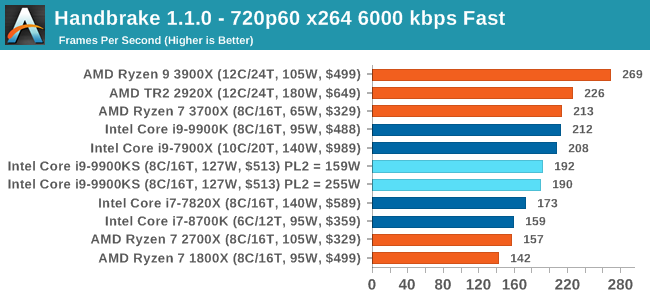
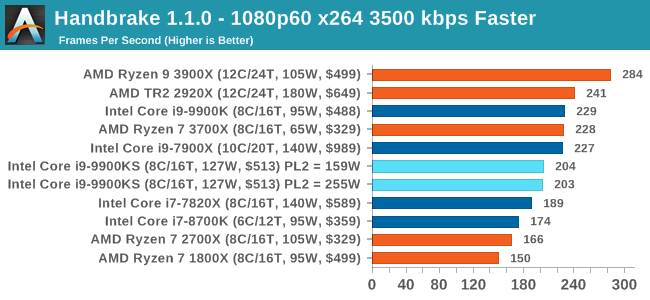
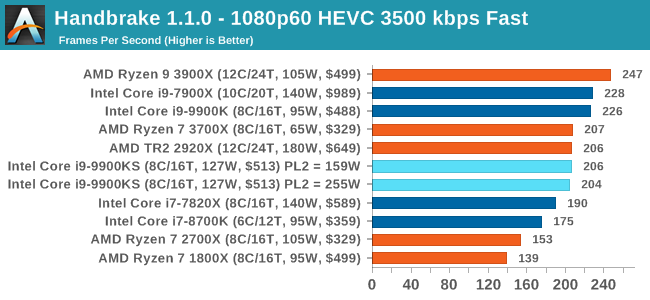
The 9900KS performed worse than our 9900K in our Handbrake tests, and we're not entirely sure why. It might be related to the regression we saw with DigiCortex.
7-zip v1805: Popular Open-Source Encoding Engine
Out of our compression/decompression tool tests, 7-zip is the most requested and comes with a built-in benchmark. For our test suite, we’ve pulled the latest version of the software and we run the benchmark from the command line, reporting the compression, decompression, and a combined score.
It is noted in this benchmark that the latest multi-die processors have very bi-modal performance between compression and decompression, performing well in one and badly in the other. There are also discussions around how the Windows Scheduler is implementing every thread. As we get more results, it will be interesting to see how this plays out.
Please note, if you plan to share out the Compression graph, please include the Decompression one. Otherwise you’re only presenting half a picture.
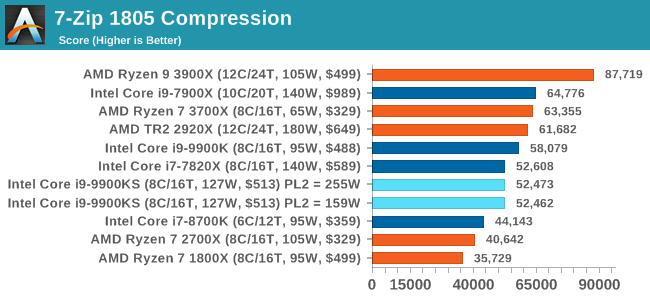
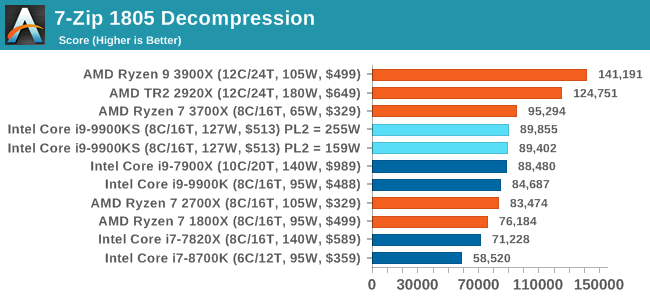
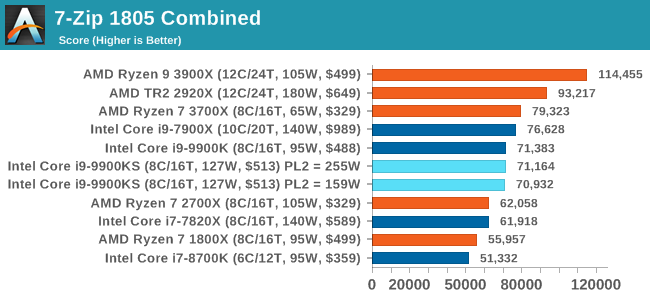
Both the 9900KS settings perform identically here, however the Compression test shows a performance regression compared to the standard 9900K. It does make me wonder if there are additional differences between the two chips (such as an internal clock).
WinRAR 5.60b3: Archiving Tool
My compression tool of choice is often WinRAR, having been one of the first tools a number of my generation used over two decades ago. The interface has not changed much, although the integration with Windows right click commands is always a plus. It has no in-built test, so we run a compression over a set directory containing over thirty 60-second video files and 2000 small web-based files at a normal compression rate.
WinRAR is variable threaded but also susceptible to caching, so in our test we run it 10 times and take the average of the last five, leaving the test purely for raw CPU compute performance.
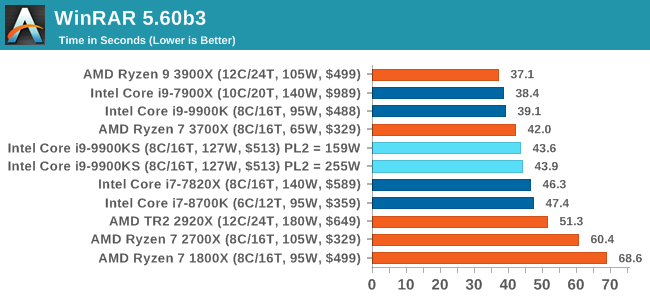
AES Encryption: File Security
A number of platforms, particularly mobile devices, are now offering encryption by default with file systems in order to protect the contents. Windows based devices have these options as well, often applied by BitLocker or third-party software. In our AES encryption test, we used the discontinued TrueCrypt for its built-in benchmark, which tests several encryption algorithms directly in memory.
The data we take for this test is the combined AES encrypt/decrypt performance, measured in gigabytes per second. The software does use AES commands for processors that offer hardware selection, however not AVX-512.
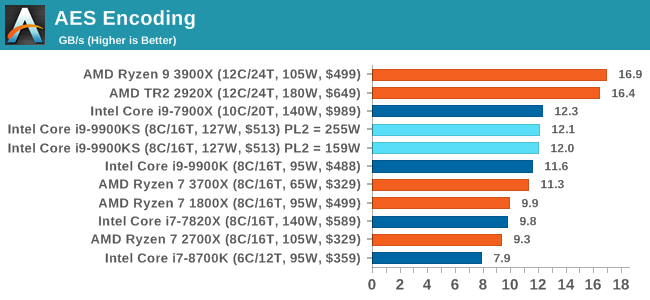










235 Comments
View All Comments
imaheadcase - Thursday, October 31, 2019 - link
So he makes a point about why people want a CPU and he is instant fanboy? Well you certainly got the boy part down pat..Jorgp2 - Thursday, October 31, 2019 - link
What are you talking about?Zen 2 only has a tiny IPC advantage over Skylake.
Spunjji - Friday, November 1, 2019 - link
10% isn't tiny, especially when boosting clock speeds by 10% is no longer trivial.Korguz - Friday, November 1, 2019 - link
imagine what it would be like if the clock speeds were higher... if zen 2 is this close, or faster with the clockspeed disadvantage it has now.. what will it be like if zen 2 was hitting 4.6+ ghz ???outsideloop - Friday, November 1, 2019 - link
We have a few months until Zen 3 clocks will leak.MDD1963 - Thursday, November 7, 2019 - link
Don't a full 10% of the 3900X samples actually have a core or two hit their advertised 4600 MHz for about 5 full consecutive seconds....sometimes? :)Korguz - Friday, November 8, 2019 - link
dont intel cpus NEED the higher clocks in order to have the performance they get ? clock them at the ryzen equivilents.. and see how well they perform.. when will people realize clock speed isnt everything ??amnesia0287 - Friday, November 8, 2019 - link
What would it be like if it hit 6ghz?Does it matter since it can’t?
I am very eager to see Zen 3 tho. Regardless of all the fanboys. I feel like it’s very much a mixed bag to chose between intel and amd just cause of some of the instruction sets and #of threads used by various things.
But if even half of the stuff about Zen3 is true 2020 should be AMDs year as I don’t believe anything intel launches until 2021 is really gonna be competitive.
rocky12345 - Tuesday, November 5, 2019 - link
Zen 2 has more like 13%-15% IPC gain over released Intel CPU's right now at same clock speeds depending on work load. There was a video on Youtube where one of the bigger YT channels did a side by side of AMD Zen 2 CPU and Intel 9900K both @4GHz and I was surprised that the AMD chip was ahead in most everything by a fair amount.When it came to gaming though Intel had a slight lead in a few games that seemed to favor Intel. But there were also games that AMD got wins from a s well. This would explain why AMD with a CPU with same core count is now able to match Intel even though AMD has a lower clock speed and even come close or match in a lot of games. I am no fanboy for either camp I currently only own Intel based systems but would be more than willing to look at either camps hardware when I do my next set of upgrades. That is just how good things are now on either side ans with AMD finally back in the game and putting pressure on Intel prices are also now getting better on the Intel side of the street as well. It is a win for everyone when things like this start happening.
AshlayW - Friday, November 1, 2019 - link
Hey, it's a good thing the 3900X doesn't have slow cores then, does it :)Seriously, though. i3-9350KF exists, go buy that if you want clock speed :P